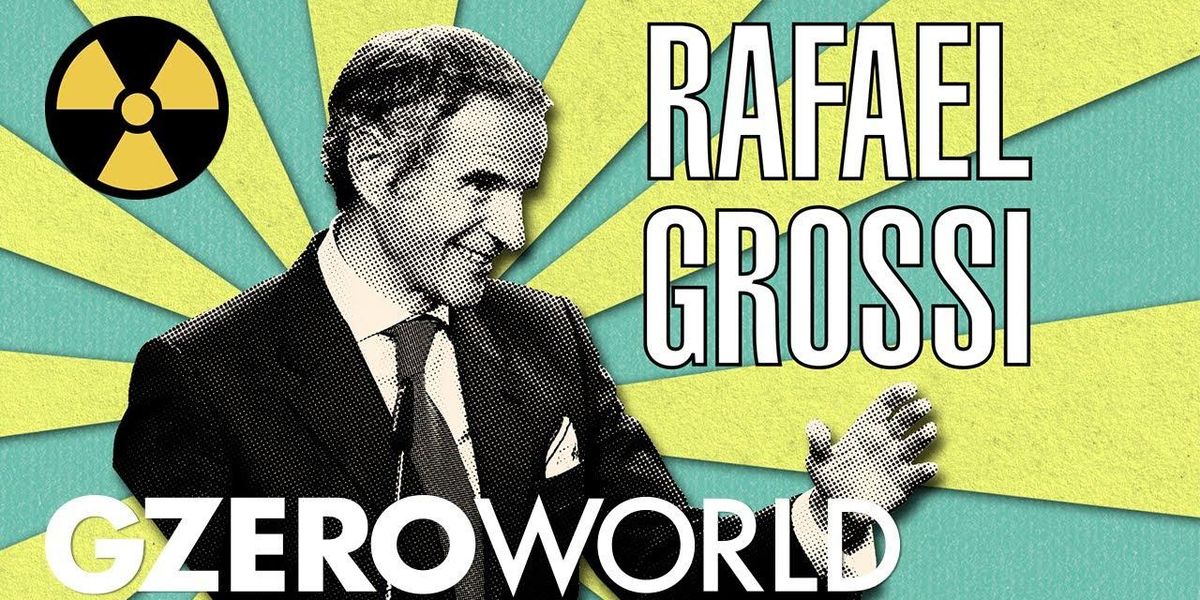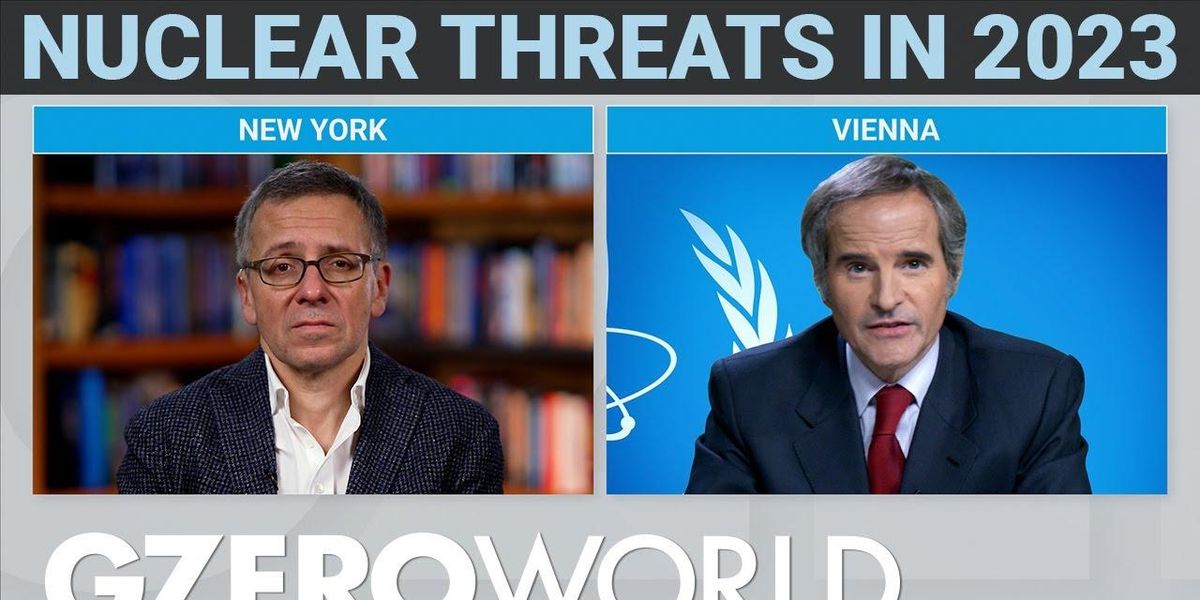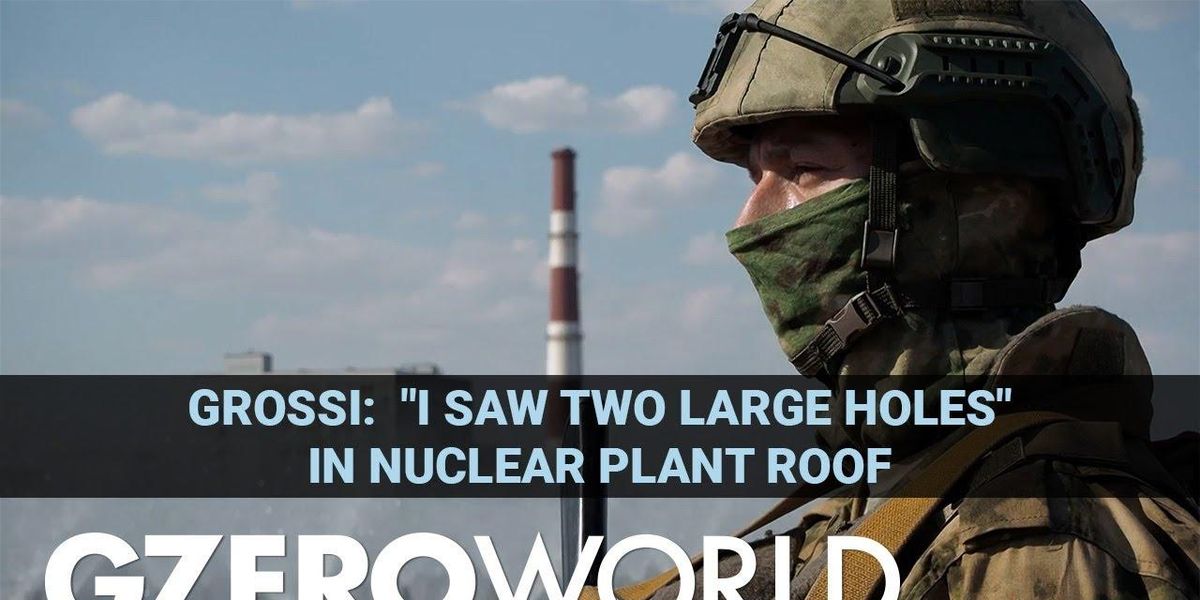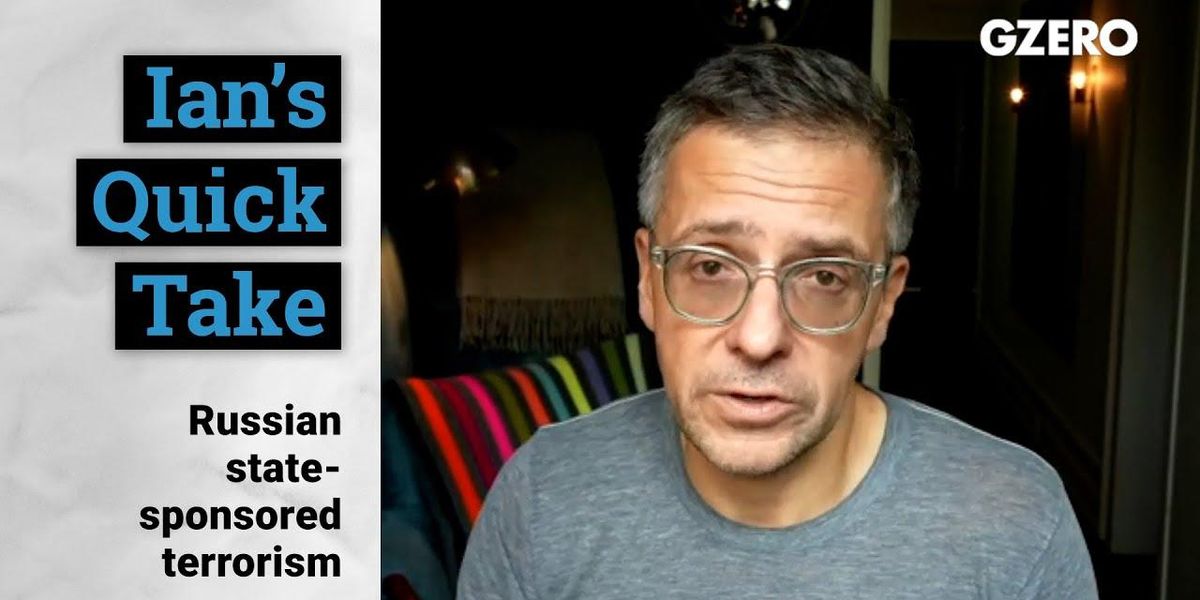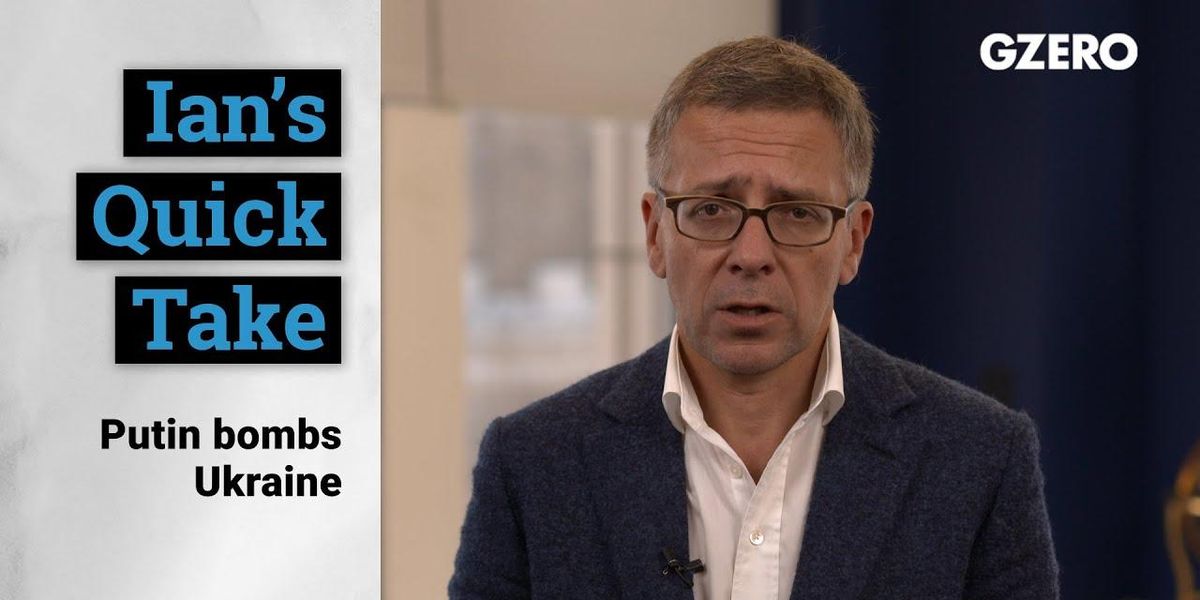Trending Now
We have updated our Privacy Policy and Terms of Use for Eurasia Group and its affiliates, including GZERO Media, to clarify the types of data we collect, how we collect it, how we use data and with whom we share data. By using our website you consent to our Terms and Conditions and Privacy Policy, including the transfer of your personal data to the United States from your country of residence, and our use of cookies described in our Cookie Policy.
{{ subpage.title }}
Russian President Vladimir Putin during a meeting in Moscow.
Is the Zaporizhzhia Nuclear Power Plant at risk of attack?
Kyiv has warned of an impending Russian attack on the Zaporizhzhia Nuclear Power Plant in southeast Ukraine, raising fresh fears of a nuclear disaster in a region all too familiar with the risks of nuclear calamity (Zaporizhzhia is just 325 miles south of Chernobyl).
President Volodymyr Zelensky said in recent days that Moscow had planted explosive devices on the roof of the Zaporizhzhia plant, though that has not been confirmed by the UN’s nuclear watchdog, which has asked for expanded access to the facility.
Throwing a wrench in the works, Russia, which controls the plant, claims that it’s Ukraine that plans to attack it while blaming the Kremlin – a harder-to-believe move as it would wreak havoc on Ukrainian cities.
This comes amid new revelations that in a face-to-face meeting back in March, China’s President Xi Jinping warned Russia’s Vladimir Putin against using tactical nukes in Ukraine.
(For more on China’s perspective on the war, see here and here.)
Indeed, news of Xi’s earlier warning reveals two crucial things. First, that the Chinese aren’t convinced by Putin’s claim, made last October, that it wasn’t in the Kremlin’s interest to use nukes. Second, the leak, which must have come from the Chinese, suggests that Xi is keen to let interested parties – particularly the Europeans – know that he has been consistently telling the Kremlin behind closed doors that throwing tactical weapons into the mix would be a mistake.
This media leak puts Putin in a tricky spot. Even if the Kremlin wants to bomb the Zaporizhzhia plant and make it look like a Ukrainian hit job, it’ll be harder to pull off now given China’s not-so-subtle warning. After all, Moscow is relying on ongoing Chinese imports of Russian oil to keep its economy afloat.
The world’s nuclear threats and what the IAEA is doing about them
Note: This interview appeared as part of an episode of GZERO World with Ian Bremmer, "Rogue states gone nuclear and the watchdog working to avert disaster" on January 16, 2023.
International Atomic Energy Agency chief Rafael Grossi witnessed first-hand how close we came to another Chernobyl disaster thanks to fighting near the Zaporizhzhia nuclear power plant in southern Ukraine. On GZERO World, Ian Bremmer asks Grossi about the world's nuclear threats and what the IAEA is doing about them. Grossi views himself as a mediator — if leaders are willing to listen to him.
Grossi, known as the top nuclear watchdog, discusses the most urgent problems he is monitoring. Kim Jong-un called for a exponential increase in his country's arsenal. Russian president, Vladimir Putin, has turned his country into the world's most dangerous rogue state. His military also controls the Zaporizhzhia nuclear power station in Ukraine. Putin also has at his fingertips the largest nuclear arsenal on the planet, even a little larger than America's, nor has he been subtle about his willingness to use it. Meanwhile, Iran, Russia's most important military ally, has been steadily at work developing its own nuclear weapon capabilities.
Watch the GZERO World episode: Rogue states gone nuclear and the watchdog working to avert disaster
Rogue states gone nuclear and the watchdog working to avert disaster
What keeps the head of the UN's nuclear watchdog up at night? It's not only Vladimir Putin threatening to use a tactical nuke in Ukraine.
Weeks ago, International Atomic Energy Agency chief Rafael Grossi witnessed first-hand how close we came to another Chernobyl disaster thanks to fighting near the Zaporizhzhia nuclear power plant in southern Ukraine. And then there's Iran, on the cusp of getting the bomb, and North Korea, a rogue state amassing an entire arsenal of nukes.
On GZERO World, Ian Bremmer asks Grossi about the world's nuclear threats and what the IAEA is doing about them. Grossi views himself as a mediator — if leaders are willing to listen to him.
- Iran nuclear deal is dead ›
- US Energy Secretary on the Ukrainian nuclear power plant in peril ›
- Zaporizhzhia nuclear plant at risk of disaster, says top nuclear watchdog ›
- US threat levels from foreign and domestic enemies ›
- Nuclear weapons could be used; Russia's war gets more dangerous ›
- Putin hosts Kim Jong Un at arms summit - GZERO Media ›
- The world’s nuclear threats and what the IAEA is doing about them - GZERO Media ›
- The nuclear fusion breakthrough, explained - GZERO Media ›
- North Korea on a nuclear rampage, says IAEA chief - GZERO Media ›
- Iran getting the bomb? Not as close as you might think - GZERO Media ›
Podcast: Nobody wins in nuclear Armageddon: Rafael Grossi's plan to keep us safe in time of war
Listen: What keeps the world’s top nuclear watchdog up at night? It's not only Vladimir Putin threatening to use a tactical nuke in Ukraine. On the GZERO World podcast, Rafael Grossi, Director General of the International Atomic Energy Agency, joins Ian Bremmer to discuss the most imminent nuclear threats. He discusses his recent trip to an embattled Ukrainian nuclear power plant, the path forward for Iran after a scuttled deal, and how to keep North Korea in check, a rogue state amassing an entire arsenal of nukes.
Subscribe to the GZERO World Podcast on Apple Podcasts, Spotify, Stitcher, or your preferred podcast platform, to receive new episodes as soon as they're published.Zaporizhzhia nuclear plant at risk of disaster, says top nuclear watchdog
Weeks ago, the head of the top global nuclear watchdog visited the Zaporizhzhia nuclear power plant in southern Ukraine. He saw two big holes on the roof caused by high-caliber ammo that could have impacted the fuel.
On GZERO World, International Atomic Energy Agency Director General Rafael Grossi gives Ian Bremmer a first-hand account of the precarious situation there — and how close we came to "dramatic" consequences.
For Grossi, a major problem right now is that both the Russians and the Ukrainians consider the facility as part of the battlefield. He doesn't care who's doing the shelling now, whether it's Russians or Ukrainians, because his mission is to prevent disasters.
Although neither Moscow nor Kyiv have agreed to his safe zone, Grossi thinks he's getting through to Vladimir Putin and Volodymyr Zelensky.
They don't have to listen to each other, he clarifies, as long as they listen to him on protecting Zaporizhzhia.
- What We're Watching: Trump obstruction evidence, IAEA team in Zaporizhzhia, IMF-Sri Lanka bailout deal ›
- What We’re Watching: Argentine VP assassination attempt, Ethiopian escalation, Zaporizhzhia tour ›
- US Energy Secretary on the Ukrainian nuclear power plant in peril ›
- Hard Numbers: Ukraine nuclear inspection, US Navy near Taiwan, Libya on the brink, Greece-Turkey air dispute ›
- The Graphic Truth: Who's nuclear in the EU? ›
- Will Putin drop a nuke on Ukraine? ›
- Rogue states gone nuclear and the watchdog working to avert disaster - GZERO Media ›
- The world’s nuclear threats and what the IAEA is doing about them - GZERO Media ›
Emergency workers during an emergency response drill to simulate the aftermath of a dirty bomb explosion outside Madrid.
What We’re Watching: Fact vs. fiction in Ukraine, Petro vs. Big Oil in Colombia
Information wars in Ukraine
The Russian and Ukrainian governments are working hard to persuade the world that the other side is planning to commit an atrocity. The Kremlin has claimed more than once in recent days that Ukrainian forces intend to set off a so-called “dirty bomb” as part of a plan to bolster Western support for Kyiv and add pressure on Moscow by blaming Russia for the attack. Ukrainian and Western officials warn that Russia has invented this story to hide its own plans to use banned weapons and that Russian forces are planning a radioactive “terrorist act” with material stolen from the Zaporizhzhia nuclear power plant it continues to occupy. This is a reminder of two things. First, both sides know that information remains a powerful weapon of war. Second, international monitors are badly needed on the ground inside the war zone to separate fact from fiction. Russia’s credibility with Western governments is now close to zero, but nothing can be taken at face value during the active phase of a war.
Petro takes on Big Oil in Colombia
On the campaign trail, Colombia’s recently elected leftist President Gustavo Petro was perfectly clear about his intention to wean the country off of oil and coal exports. Now, just two months into his term, he’s taking steps to make good on that, setting up a big fight with the Colombian extractives industry. Petro wants oil and coal companies — which account for nearly 10% of Colombia’s GDP and half of exports — to foot almost half the bill for a massive new tax hike meant to fund expansive social spending plans. Critics worry that the move will stifle investment in the sector, but supporters say that’s precisely the point — to move beyond fossil fuels. The fight with the industry comes as Petro’s approval rating is suffering. It has fallen 10 points — to 46% — since he took office in August, and the peso is one of the world’s worst-performing currencies this year. See our recent interview with Petro here.Russian attacks on Ukraine are state-sponsored terrorism
Ian Bremmer's Quick Take: Hi everybody. Ian Bremmer here. A Quick Take to kick off your week, and of course we are still talking about the ongoing war in Ukraine.
Almost eight months now of since the initial invasion of Russia into Ukraine. The war continues to get worse. There's more hits on Ukraine. 30% of the country's electricity has been disrupted. More hits on cities focused on civilian casualties over the last week. These are the attacks that we've seen across the country by mostly missile and drone attacks by the Russians. Not even trying to say that these are military targets anymore. It's really state-sponsored terror by the Russian government.
The big question going forward first is can Russia hold their own line? In other words, with their Ukrainian counterattacks before winter approaches and before it gets a lot harder to continue these, the movements on the ground, how much territory can Ukrainians take? Is the Russian mobilization going to be able to slow or stop them? Because this is the critical point. If the Ukrainians are able to break Russia's links to the Ukrainian south, and particularly to the peninsula of Crimea, that's when it gets particularly dangerous. If the Russians are no longer able to defend Crimea, I think that's the one point that you would see all out escalation by the Russian government, because this kind of a loss would be just an unacceptable hit to Putin's strategy. It would show that not only the invasion since February 24th had failed, but his entire strategy for the last 10 years had failed. And I think the opposition to that within his military forces, his close advisors would actually be quite severe at that point. So that'd be dangerous for him to allow that to happen.
Now, we've seen that the bridge, the Kerch Bridge from Russia to Crimea, which was hit and the Russian government said, "Oh, we've got it fully back up and running the next day." Turns out, of course, that's lie. And that in reality it's going to take until next year, mid next year earliest, assuming no further disruptions for the Russians to be able to get that bridge fully back up and functional. So there is some transit and traffic that's going forward on it, but it's certainly not fully operational.
Beyond that, you have Kherson, which is where the water goes to Crimea, and the Ukrainians are actively fighting in Kherson. The Russians have announced that they've got the program to get Russians to leave the country so they don't have to deal with the constant shelling, as they say, or what we more reasonably would call it, an evacuation. So there is certainly a possibility that the Ukrainians will be able to take Kherson. And cut that off. And then thirdly, Zaporizhzhia, which is the land bridge between Crimea and Russia that has been taken by the Russians. That includes Mariupol, for example, the big city that was basically leveled with the thousands of Ukrainian civilian casualties. Nobody's pretending that people on the ground actually want to join Russia, but it's absolutely true that if you want to hold Crimea in the face of Ukrainian counteroffensive, that being able to stalk and resupply the south is absolutely critical.
So if over the coming two, four weeks, the Ukrainians are able to puncture that land bridge and take most of Kherson, at that point, no matter how many troops the Russians are remobilizing with, they can't get them to the Ukrainian south, which potentially means that Crimea itself is vulnerable.
Now, there are a lot of people that don't want the Ukrainians to be able to retake Crimea, because it's really dangerous. I'm deeply sympathetic to that view. Crimea is different than the territories taken since February 24th. It's overwhelmingly Russian, ethnic Russian, Russian speaking. If you talk to them on the ground. They never wanted the Soviet Union to fall apart. They consider themselves a part of Russia. When they were a part of Ukraine, Crimea was an autonomous republic. It was governed locally. Their foreign policy was determined by Ukraine, but their local governments was completely determined by their own parliament that they elected with a majority of Russian parliament members. And it even had a Russian tricolor flag that flew above it. And not only if the Ukrainians tried to take Crimea, would it potentially be a very significant escalatory move against Russia, but also be very hard for them to take because the people on the ground in Crimea, the locals, really don't want to be a part of Ukraine, again, unlike all of the rest of Ukrainian territory. All four of the illegally annexed regions of Ukraine, where the majority, granted a lot of them have fled at this point, some of them are dead at this point, but the majority of the population on the ground in those territories would want very much to be a part of Ukraine.
Okay. So that's a close call, and that's what we want to watch over the course of the coming weeks. There's a lot of talk about Belarus potentially coming into the war. The Russians have announced joint forces with Belarus. There's been a lot of military movement of material over the weekend. I am skeptical there. I suspect what the Russians are trying to do is make a big deal out of it to try to get the Ukrainians to defend more territory, which will give the Russians a better shot of holding the line in the critical areas of the southeast that they're trying to get the remobilization forces to.
If the Belarusians were to formally enter the war, not only are there very few troops and they have horrible morale and they aren't trained well, but also there would be very significant instability, social dissent in Belarus. The Belarusian government would be less well equipped to repress and to keep back than the Russian government is on the ground in Russia. So I'm not expecting that to occur in the near term, but of course it's always possible.
Finally, what can the Russians do as this war continues? A lot of talk about the fact the Russians are running out of missiles, and that seems to be certainly the case in terms of accurate long range missiles. The Iranians are selling a lot of these missiles right now to the Russians, in addition to drones. That's certainly going to help the Russians continue to engage in the war over the course of the coming months.
You also have lots of bombers, and the Russians haven't engaged in bombing runs of Ukrainian cities. Again, would just be state sponsored terror, which would kill a lot of people. Wouldn't change the nature of the territory that the Russians are holding. The reason they haven't done it, I suspect is also because they don't want to lose a bunch of bombers, because the Ukrainians would be able to shoot some of them down. But again, that would be a much less escalatory move than say use of chemical weapons or use of a nuclear weapon. So the Russians would certainly consider that. Well, before they'd consider a nuke.
Then you have asymmetrical strikes. And let's remember Nord Stream 1 and 2 which was non-operational, going from Russia over to Germany, was blown up, was sabotaged a couple of weeks ago. Who blew it up? We don't know. But there are two options. The Russians blew it up, in which case they're willing to blow up pipelines. The first of their pipelines they know aren't going to work. It's a demonstration effect like we've seen from the Iranians historically, and that the next thing they would do would be blow up other critical infrastructure. Or the West did it. The United States, Poland, perhaps more likely. They have the capabilities in both cases, and if they're willing to blow up Russian pipelines, well why wouldn't the Russians then blow up Western pipelines, or fiber, or other critical infrastructure? So either way, the likelihood of Russian asymmetrical strikes against NATO critical infrastructure is getting much higher. And indeed, last week we saw that the Norwegians arrested a couple of Russians with surveillance drones, and they were taking lots of pictures of Norwegian critical energy infrastructure. Why? Because they're probably planning on blowing it up.
So it's not just about the idea that you're not going to see any more Russian energy going to Europe. It's also the likelihood that the war itself is going to expand to these sorts of strikes. That puts a lot more pressure on Europe going forward. Also means that the Russians are going to be completely decoupled from the European economy for the foreseeable future, as long as Putin's in power, no question there.
So that's it for me. Pretty tough situation on the ground right now. We'll keep watching it and I'll talk to you all real soon.
For more of Ian Bremmer's weekly analyses, subscribe to his GZERO World newsletter at ianbremmer.bulletin.comPutin bombs Ukraine
Ian Bremmer's Quick Take: Hi everybody. Ian Bremmer here. A happy Monday to you. A Quick Take, again, turning to the war in Russia. Lots going on, almost all of it escalatory at this point. Most recent state of play, a spectacular attack by the Ukrainians on the Kerch Bridge, the Crimea bridge that was said by Putin to be impregnable, can't possibly be able to attack it. It was providing a lot of supply chain, military supply chain from Russia sourcing capabilities material into Crimea and the rest of Ukraine, and suddenly significantly disrupted by a Ukrainian truck bomb.
That led Putin to respond in the early hours today, rush hour in Ukraine. Indiscriminate attacks against all of Ukraine's major cities. Nearly 100 bombs, civilian targets, killing lots of Ukrainians. An act of state terrorism on the part of Russia. On the one hand, absolutely horrifying that the Ukrainians are living through the kind of attacks in recent years that we've only seen in Aleppo in Syria, in Grozny, by the Russians in early post-Soviet days, and now seeing it across Ukraine.
War crimes, yet again. Acting with impunity in terms of Russia's complete indifference to how the rest of the world sees him and reacts to him. Having said all of that, part of the reason why we're seeing state terrorism from Putin is because he does not have conventional capabilities to respond to the Ukrainian counter offensive, which continues to eat up territory, Ukrainian territory, that they are retaking from the Russian occupation, significantly in Kherson which is north of Crimea, but if the Ukrainians are able to take it, that would disrupt yet another key supply chain of Russia to Crimea.
Then finally, Zaporizhzhia, which is the land bridge between Russian and Crimea, you get all three and the Russians can mobilize all they want. They can't get troops to Crimea. They can't get troops to the South. This war continues to go badly for the Russians. The Russians continue to try to make the Ukrainians pay. The Ukrainians, of course, have extraordinary support from all of NATO. That continues. Russia's willingness to take these acts against the Ukrainians is only going to harden the resolve of NATO countries to continue to provide direct military support to Ukraine, and even to increase the levels of, say, air defense, missiles, and the like to defend themselves and also to be able to counterattack.
The next few months we are looking primarily at Ukrainian counteroffensives to take as much territory from the February 24th lines as they can. The Russians trying to get their troops in as quickly as they can to hold some of that territory. That's basically what's playing out. Beyond that, the big question is whether or not the Russians are going to take asymmetric attacks against NATO. If you watch this conflict played out from Russian state media and how Putin is portraying it to his people, it's that they are losing territory and they admit to losing territory. They're losing the bridge. They admit to losing the bridge, at least for a brief period of time, because of attacks from NATO. This isn't just Ukraine, it's all the intelligence. It's all the ordinance. It's all the money. It's all the training. They're fighting against NATO.
Well, are they going to do anything against NATO? So far what they've been doing is only against Ukraine. And the ability of the Russians to engage in asymmetric attacks against fiber attacks, cyberattacks, pipeline attacks, critical infrastructure attacks, things that the Europeans need to be able to function as normal economies, and yet well short of weapons of mass destruction on the ground in Ukraine. If the Russians were to take steps like that, how might NATO respond? That is, I think, a big question that the European leaders are asking themselves and we don't have a clear answer for. I do expect that over time, especially as it is clear that Russia's economic stranglehold on energy for the Europeans is increasingly not going to make a difference in terms of NATO response, that Putin has to think about what else he can do.
Suing for peace does not appear to be in his playbook at this point. The other thing I would say is watch carefully the Chinese, the Indians, other countries that have been more supportive or at least more willing to be on the sidelines for Putin, increasingly are being outspoken and saying they want an immediate ceasefire. They want the Russians to stop this war. Putin has been ignoring them thus far. Will he continue to, and will those countries be willing to make Russia pay any cost themself? So far they have not. That may change.
One disturbing side, we have coming up very soon in the General Assembly, a global vote that will be taken about condemning the Russian annexations of the four Ukrainian territories. That will easily pass, but it looks like the number of positive votes are going to be around 100, 110. In other words, very large numbers of abstentions from the majority of the developing world. That continues to be the story here. That because Ukraine is being treated so differently as a conflict by the West than other invasions, illegal invasions in other parts of the world, where the West would normally say, "We want a ceasefire and then we'll see what we do."
Here, the West isn't calling for a ceasefire. The West is saying it's an illegal invasion, and so the Ukrainians need to be supported to take their land back. That hypocrisy, certainly that level of lack of alignment in the way the West treats Ukraine compared to other parts of the world, is leading the developing world to say we want very little part of this crisis. To the extent that Putin is increasingly seen as a war criminal globally, is involved in terrorist activities that other states would not be allowed to get away with, that of course is going to increase pressure on the developing world to get on-side publicly on this issue. Puts more pressure on Putin, too.
That's state of play right now. I still am someone who thinks that nuclear weapons, of course, are something to be worried about because Russia has lots of them and because they're in a tough position, but the likelihood of being used or being used soon in my view is still very, very low indeed. Higher than at any point since 1962. The Cuban Missile Crisis. I wasn't around for that. I don't want to be around for this, but let's hope we can avoid it.
For more of Ian Bremmer's weekly analyses, subscribe to his GZERO World newsletter at ianbremmer.bulletin.com